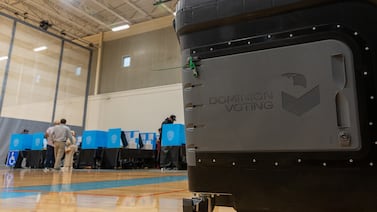Votebeat is a nonprofit news organization reporting on voting access and election administration across the U.S. Sign up for Votebeat Michigan’s free newsletter here.
Warren, Michigan, had only a few thousand absentee ballots waiting to be tabulated by 10 p.m., Secretary of State Jocelyn Benson said Tuesday, helping to alleviate — but not eliminate — concerns that the closely watched city in Macomb County could cause big delays in reporting statewide vote totals.
After polls closed, Warren poll workers were moving quickly to process the rest of the absentee ballots, including ones that were turned in to drop boxes around the city. Results for all of Macomb County were slow to come in, County Clerk Anthony Forlini said, but Warren wasn’t the primary cause.
“We had several places where voters were still in line past 8 p.m.,” Forlini said. “It’s a voter enthusiasm problem that we have here in Macomb.”
Warren City Clerk Sonja Buffa had drawn ire from Forlini as well as state officials for her decision not to take advantage of a new law and use the days before the election to pre-process absentee ballots. The law allows election workers to begin opening absentee ballots, validating them, and even feeding them into tabulators as much as eight days in advance.
Buffa told Votebeat that she declined because was confident in getting results in a timely manner, citing her two decades of experience.
“We’re moving along well,” she said, gesturing to a high-speed tabulator just before polls closed. “Everyone’s doing great work today.”
More than 28,000 voters in Warren requested absentee ballots, one of the highest numbers in the state.
In Sterling Heights, Warren’s neighbor and a community nearly identical in size, City Clerk Melanie Ryska told Votebeat around 5 p.m. that her team had finished tabulating early votes several hours earlier.
Her workers had tabulated more than 20,000 ballots, Ryska said, and had only a few thousand more outstanding — the final absentee ballots that voters had dropped off on Election Day.
In past elections with more limited rules, before a 2023 change in the law, “pre-processing wasn’t really worth it,” Ryska said. “You could only open the envelope and verify, and that wasn’t really worth it. The early tabulation we have now is a lot better, because it means we’re already most of the way done with thousands of ballots.”
Voters were keeping a special eye on Macomb County, where the results could help determine who is the next president of the United States. Macomb has for years been seen as a swing county and a bellwether for the rest of the country, which is why Warren’s quick tabulation is key to getting full state results out promptly and heading off conspiracy theories and misinformation.
Around the rest of the state, some of the biggest concerns on a relatively peaceful Election Day were over stickers, not bottlenecks with counting ballots.
Even Detroit — site of an uproar in 2020 because of delays in counting absentee ballots — had processed ballots “even more smoothly and efficiently than we thought going into today,” Benson said. The city had processed all absentee ballots that had come in before 4 p.m. by about 9:30 p.m., she said, and others were moving quickly. City officials estimated Detroit would be done counting shortly after midnight.
“Today was a day that was full not of chaos or confusion or fear, but of confidence, celebration, and yes, pride,” Benson said Tuesday night, thanking those who worked or participated in the election.
Like several swing states, Michigan got bomb threats and dealt with unfounded claims about election integrity. But officials with the state said investigations into both sets of claims were unfounded.
Angela Benander, spokesperson for the Department of State, confirmed Tuesday afternoon that several polling places in Michigan had gotten bomb threats, although she could not say where.
The threats are “all not credible,” she said. “There is no concern for safety at those polling places, because they’ve been cleared by” state police. It did not appear that threats had disrupted voting in Michigan, as they did in Georgia.
Other problems around the state were the type that one might expect when thousands of polling places across the state open at once. In the Wayne County portion of Northville, a gas leak at one precinct meant that city officials had to move a polling place; in Oakland County’s Rochester Hills, tabulators giving error messages were quickly replaced, the city clerk there said. Lines were long in some of the state’s largest cities, such as Detroit and Flint, but most clerks reported things moving smoothly and quickly.
“We got in and out almost immediately,” PJ Petroulias, a voter in Warren, told Votebeat. “I was planning to vote early, but I just ran out of time. So I showed up today and got in immediately.”
At several polling places, the adhesive souvenirs that say “I Voted” were a big sticking point. Voters wanted the stickers designed by people around Michigan, released for the first time during the general election. Not every polling place offered them, though.
“People want the cool stickers,” Maryanne White, a poll worker at Carter Middle School in Warren, said two hours before the close of polls. She sat near the door, passing out more generic oval “I Voted” stickers to voters after the ballots went into the tabulators. “We had them during early voting, but now we only have these, which are not as cool. People are getting very mad about it.”
State officials said the other stickers would be available at Secretary of State offices around Michigan as early as Wednesday.
Hayley Harding is a reporter for Votebeat based in Michigan. Contact Hayley at hharding@votebeat.org.





